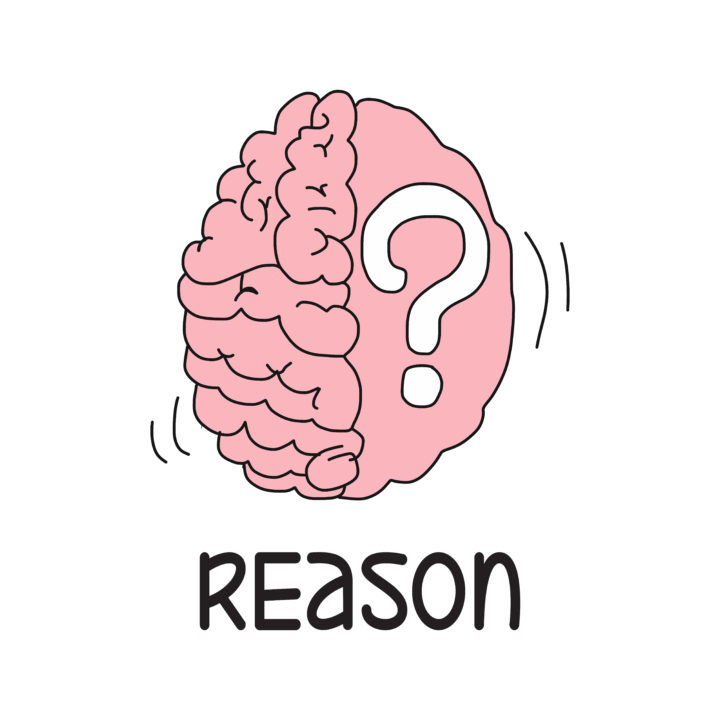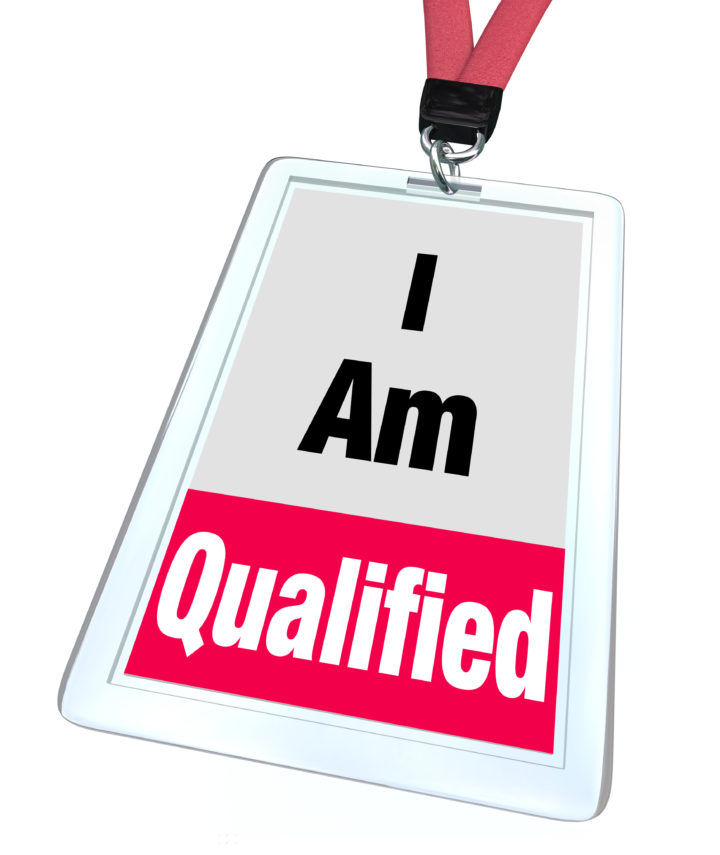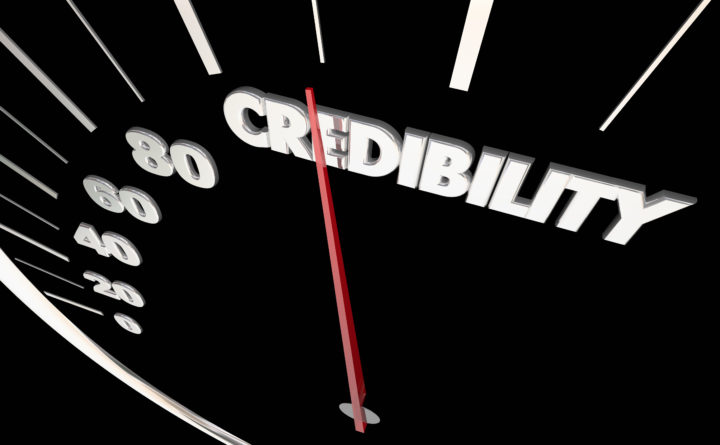Podcast: Play in new window | Download
Some of you may remember some old commercials for a brokerage house called E.F. Hutton. They would show two guys talking in a crowded place, such as a restaurant or a golf tournament. One guy would say, “My broker is E.F. Hutton, and E.F. Hutton says…” Immediately everyone around them would stop what they were doing and listen intently.
What if people did that every time you opened your mouth? That would be what I call Max Cred. If you’re a knowledge worker, your personal credibility is your most precious asset. It’s not your knowledge, which is worthless if others don’t believe what you say; it’s not your eloquence, if others don’t listen; it’s not your power, if others only agree grudgingly. Like any asset, you want to preserve it, grow it, and put it to work.
That’s because unless you’re a dictator, hermit or independently wealthy, so much of what you need or want to do in life depends on getting things done through other people, and your ability to influence others is directly correlated to how much they rely on what you tell them. Credibility opens doors, gets attention, influences decisions, and makes it safe for others to act on what you tell them. Simply put, credibility drives results.
Everybody wants to matter, which simply means being able to influence others’ thoughts, beliefs, decisions and actions. In turn, that means that every speaker wants the audience to believe them: what they say and how they feel about the topic at hand. This can be easy to achieve for low-stakes, mundane topics, but it can be very difficult to achieve when asking someone to take a risk, expend a large cost, or change deeply-held beliefs. That’s when you need every advantage you can muster to compel belief.
Credibility is critical because:
- Most proposals aren’t “provable” based only on facts, so decision makers will rely to some extent on how credible they perceive you to be in making your case.
- It allows you to punch above your weight class by giving you influence above and beyond your job title.
- It makes you worth listening to. Everybody is distracted nowadays, so you have to give them a reason to invest their attention in you.
- It saves you time, because you don’t need to spend as much time and effort to convince others. You get fewer questions and micromanagement.
- If you’re a leader, you can’t rely on authority alone, because that doesn’t get the best work out of people.
What does max cred look and sound like?
Your credibility level can range from zero to max, and of course it depends on the situation or the topic at hand. What does max cred look like? When you open your mouth to speak in a meeting, people pay attention, like in the E.F. Hutton commercial. What does max cred sound like? When you say “Because I said so”, or some more tactful variant of that phrase, people treat it as hard data.
We all know that “because I said so” is not a valid reason for doing things, but in reality we rely on it all the time. Think about it from the point of view of a CEO listening to a technical presentation in order to make an important decision. The topic can be very complicated for a non-specialist, and it requires a lot of effort to understand all the nuances. Psychologist Daniel Kahneman tells us that when the mind is faced with a tough decision, it often falls back on answering an easier question. In this case, the easier questions often is: “Do I believe this person?” “Does she sound like she knows what she’s talking about?”
The CEO’s mind sees that as an easier questions because he is unconsciously processing a lot of cues—in her content, her confidence, the language she uses, her motivations, etc. By the way, that’s not a flaw—it’s a necessary shortcut in the mind and a design feature in the organization. The whole reason many people have jobs in organizations is because the person running the place can’t know everything. If the CEO had to fact-check every presentation and master every topic, she would never get anything done. So, credibility is not just a crucial personal asset, but an organizational one as well.
Put another way, max cred means that others strongly rely on your statements and your judgment to make decisions, and they weight them more heavily than other sources. They accept it quickly and are less likely to question it.
For example, I get a lot of emails from Amazon touting newly released books. If I’m familiar with the author’s previous work and hold a favorable opinion of it, I spend less time reading reviews or perusing the table of contents before deciding whether to buy. At the time that I write this, I have already pre-ordered books by Steven Pinker and Hans Rosling, almost without even reading the book descriptions.
In my own work, credibility is critically important. A major part of my work is teaching professional salespeople and the rest usually involves teaching engineers, who can be deeply skeptical and data-driven. Salespeople can be a demanding audience because they want to know that whoever dares to teach them something new has carried the bag, has experienced the same difficulties, solved the same problems, and had the same or greater success that they have.
When I first began my training career, I had less direct experience than a lot of my students, and I was perhaps overly conscious of my perceived lack of qualifications, so I had to figure out ways not only to quickly get up to speed but to survive until I got there.
While I made plenty of credibility mistakes in the early years, over time, both through learning from those mistakes and through my successes, plus a lot of reading what the top experts have to say about it, I’ve uncovered ways to develop and preserve max cred.
What is credibility?
The answer to this question may seem as simple as Justice Potter’s definition of pornography: “I’ll know it when I see it,” but if we stop there it won’t help us figure out how to improve it. So let’s give it a shot:
Credibility is an impression formed in the mind of your listener at the time of communication about the extent to which they can rely on what they hear from you to shape their thoughts, influence their decisions, or inspire their actions.
Credibility is not something you “have”, it’s something that others “give” you every time you communicate with them. You can have truth, but no credibility unless others accept it as true. That means that it may be different for every person, because they have different standards and perceptions; Because of this, it’s not a universal quality, it’s situation-specific. Others may deem you to be credible on a certain topic in a particular situation, but not in another.
This is an important distinction because it makes you realize that every situation is different, and that you have to work to establish belief in the minds of your audience every single time. Just when you begin to take it for granted, it can be destroyed in an instant. It actually exists outside of yourself; it’s something that others give you or don’t, because of credentials you’ve earned, what you say or do, and how you say or do it.
Credibility is not binary; it’s like the difference between an on/off switch and a dimmer switch. People don’t ask themselves if you’re credible, they ask themselves how credible you are. In other words, they are calculating a probability judgment about the likelihood that what you’re saying is true and useful.
Credibility is closely related to trust, but it’s not exactly the same thing. At least in the way I define it and approach it in this book, credibility relates to the communication aspect, how much people can rely on what you say. Trust is bigger, it also includes how much they can rely on what you do.
What makes you credible?
It’s going to take this whole series to adequately answer this question, but let’s get an overview.
As far as we know, the Greeks were the first to study credibility formally, which made sense since their form of government was the first to rely on persuasion rather than pure force. Democracy in ancient Athens was very direct; if you wanted a law passed you went to the agora and delivered a speech yourself. Aristotle called it ethos and said it was the most important of three means of persuasion, along with logos and pathos. According to him, an audience perceived a speaker’s ethos by asking three questions:
- Does the speaker have good sense?
- Does the speaker have good character?
- Does the speaker have goodwill?
More recently, psychologists have studied credibility more scientifically and systematically. Using a statistical technique called factor analysis, researchers have teased out the various factors that affect perceived credibility. There are According to professors Robert Gass and John Seiter, there are three primary dimensions which apply generally, and three secondary dimensions which are situation-specific. The primary dimensions are expertise (aka competence or qualification), trustworthiness (character or integrity) and goodwill (cares about me). The secondary dimensions are extroversion, composure, and sociability.[1]
As you’ll see, I’m going to explain credibility in large part using a combination of Aristotle, modern psychology, and personal experience gained from three decades studying and teaching persuasive communication in practical business applications. That allows us to break down the mystery of credibility into specific elements which can be improved or strengthened with preparation, practice, and growing skill.
Taken altogether, we have the “Seven Cs” of Max Cred:
- Credentials
- Content
- Clarity
- Confidence
- Connection
- Caring
- Cultivating
ACTION STEPS AND POINTS TO PONDER
- Think of someone whom you find to be especially credible. What are the strengths they show relative to the Seven Cs?
- Think of someone whose credibility you question. What are the weaknesses they show relative to the Seven Cs?
- For the next few days, pay attention to others as they communicate in meetings or directly with you, mentally apply the Seven Cs checklist to them.
- Think about your own interactions with others, and apply the Seven Cs to yourself.
- List your areas for improvement and keep those in mind as you listen to this series.
[1] Persuasion, Social Influence and Compliance Gaining, Robert H. Gass, John S. Seiter, p. 79.






